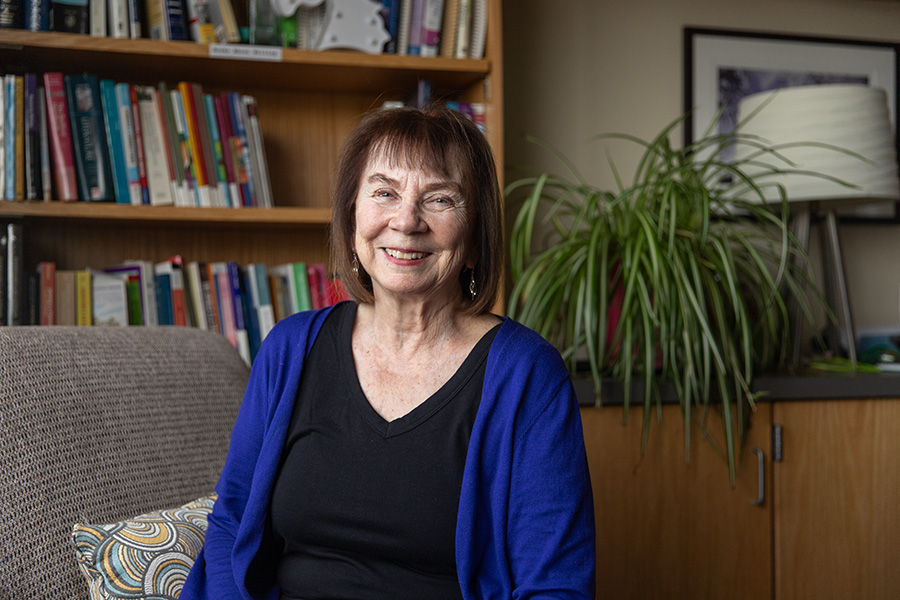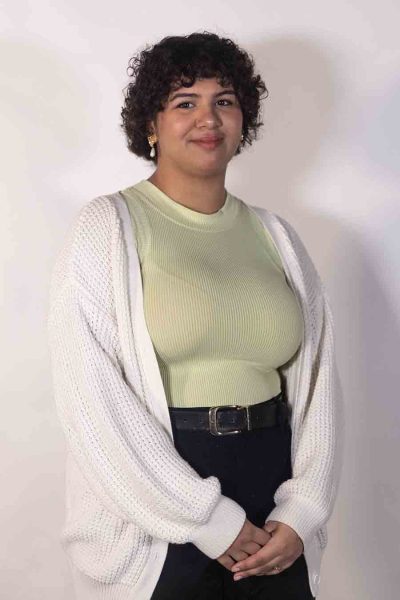There have been 10 presidents at Ithaca College since its start as a music conservatory, all of whom have led the college through periods of great change. Barbara Adams, associate professor in the Department of Writing, has been employed at the college for six of those 10 presidents. Now, as the college’s longest-serving faculty member with over 50 years of teaching, advising and innovating what it means to be a writer, Adams is retiring.
Before the college even had a writing department, Adams began her career on South Hill in 1972 as an instructor in the Department of English. She said that at the time, writing was a small subsection of the English department only offered as a lecture-style course.
Adams said it became apparent that the college’s approach to teaching writing left students feeling discouraged because it gave the false impression that those who did poorly in English literature classes would do poorly in writing classes.
“At some point, very early on in the ’70s, six of us who were part-time thought, you know, one of the reasons our students have so much difficulty is that they associate writing with [analyzing] English literature,” Adams said. “And we loved literature, but we thought writing is so much more than that — if we could develop a program that shows that.”
In 1973, the Department of Writing — then known as the Writing Program — opened to provide students the ability to immerse themselves in the world of writing without heavy emphasis on English literature. Academic writing was taught as an initial class, but more courses soon developed to match student and faculty interests. Adams herself taught more than 33 different courses in the department, including Academic Writing, Personal Essay, Magazine Writing and Editing & Publishing.
“It was very generative,” Adams said. “We just grew like weeds. … We ended up with a curriculum with — I think it was well over of about 40 courses [with] just lots and lots of different kinds of writing — creative writing, journalistic, expository, all sorts,”
Susan Adams Delaney, associate professor and chair of the Department of Writing, first met Adams in 2007 when Delaney came to teach at the college. Delaney said she was captivated by Adams’ attentiveness to details at faculty meetings and how committed she was to improving the writing department — not only for students, but for faculty as well.
“[Adams] in particular had just such a keen eye for all of those details about how has this curriculum grown, how did we develop these courses, why are we doing things the way we are, what are some things we had discussed in the past that we need to revisit now,” Delaney said.
Adams said there was great care placed in training students to be professional writers, not just creative writers. One of the ways Adams did this was through the creation of the Careers for Writers lecture and discussion series, which is aimed at teaching students how to navigate the professional world. The course frequently brings in professional writers to speak with students and also offers information on resume building and how to find jobs post-graduation.
“The students here are wonderful, but their lives don’t stop when they leave college,” Adams said. “And I can’t just think of today in the classroom, I have to think of, well, what about next year and five years down the road? And so that’s what’s driven me to help them negotiate that path because when I was coming up, nobody helped me do that.”
It was that desire to help students that led Adams to create the Internship Program in Writing & Publishing in 2001. From 2001 to 2023, Adams sponsored about 550 academic-year internships, at a wide variety of sites.
Matthew Gardener ’23 was one of many students who said he had Adams as a professor for several writing classes, like Public Essay and Editing & Publishing — the latter of which Gardner said inspired him to look into pursuing a career in publishing.
“So in those two classes, just overall, I think [it] really helps people make that transition between the educational and college world into the professional world; that was something that was reflected in the courses,” Gardener said. “We were always talking about the professional context for how the publishing industry was and she would bring in guests from all different places in the industry. … So we [were] always feeling not just the skills that you need to do that kind of work, but also just how those industries work [and] what kind of niches are out there.”
During her four years at the college, Chloe Eberhard ’23 said she could be found spending most of her time in Adams’ office. Eberhard said she had taken Editing and Publishing with Adams and was able to work four different internships through Adams’ recommendation.
Eberhard said the support she received from Adams throughout her internships was incomparable.
“It’s hard to figure out what’s going on in the publishing industry because it’s all behind closed doors, and she’d opened those for us,” Eberhard said.
With curriculum changes to the program, Delaney said the Department of Writing has an idea of who to look for — but Adams is someone who could never be replaced.
“You don’t replace a person,” Delaney said. “You always bring in someone new who brings their personality [and] characteristics. And that’s all you can do because college is an institution, but it is an institution that’s fundamentally about the humans who inhabit it. … We are the people who work with us and we’re also the students who come through.”
















Helen Sinoradzki • Jul 16, 2024 at 4:51 pm
I taught in the then Applied Writing Program from 1973-5 with Barbara Adams and was inspired by her dedication to teaching and to the program that was in its infancy. Down the road, I developed a course Technical Writing for Scientists, Engineers, and Managers and taught it at Los Alamos National Laboratory. My students were professionals who had not had the kind of writing classes Ithaca College offers. Brava, Barbara. Enjoy this next part of your life!
Helen (Weiss) Sinoradzki